5 Ways to Find Your Competitors' Highest-Ranking Keywords

Do you know what your competitors are doing with their marketing efforts? You probably know the basics; they'll run a seasonal sale around here, they'll offer a deal to their customers, they have a popup with a call to action and some marketing materials on their site, and so on.
What about the specifics?
- When they run paid ads, what keywords are they targeting?
- When they produce content, what are they aiming to rank for?
- When they're doing their keyword research, what keywords are they finding?
You can't get all of this information, of course. At least, you can't without bribing someone who works in their marketing department, and chances are that's a good way to get your source fired and potentially prosecuted.
You can, however, get some of this information by analyzing harvested search engine data. There are a lot of advanced tools and some tricks you can use to spy on what your competitors are doing, harvest information, and use that information in some of your marketing.
I do this all the time for my clients. When looking for topics to write for blog posts, I look specifically at what competitors are doing and look for ways to either out-do them, circumvent them, undercut them, or outperform them. It's highly effective. Why take guesses on what keywords are ranking well when you can see the data for yourself?
So, how do I do it? Here are five of my methods:
 30 Second Summary
30 Second Summary
You can learn what keywords your competitors target by using several powerful tools and methods. You'll get the best results from Ahrefs Top Pages report, which shows you their best-performing content and target keywords. You can also use Alexa's Competitor Matrix, Moz Link Explorer and SEMrush to see what's working for them. A simple Google site search will even show you their top-ranking pages. Once you find this info, you can create better content, fill gaps they missed or find new keyword opportunities they haven't discovered yet.
1. Ahrefs Top Pages
Ahrefs is an incredible tool. Normally, I'm the kind of guy who recommends using free tools whenever possible. A lot of free tools can do just as much as paid tools, they just tend to have a narrower scope, so you might need to use two or three free tools to do what one paid tool does. Ahrefs, though, that's a tool well worth the price of admission.
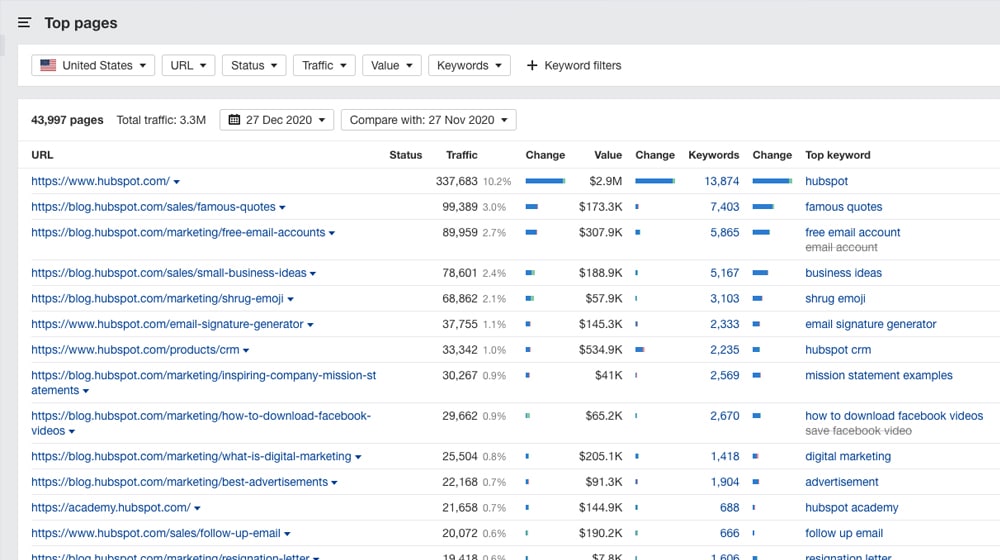
In addition to all of the incredible things you can learn and do with Ahrefs, one of their reports is incredible. It's called the Top Pages report, and it's found in Site Explorer.
There are two Top Pages reports now. The old one was great, and they've been spending the last few months improving it as a Top Pages 2.0.
Ahrefs is the second largest search crawler in the world, after Google. It's incredible how much data they pick up and index about the web. That's how they're able to generate link reports with such accuracy, and it's how they can analyze things like the keywords a given page is targeting.
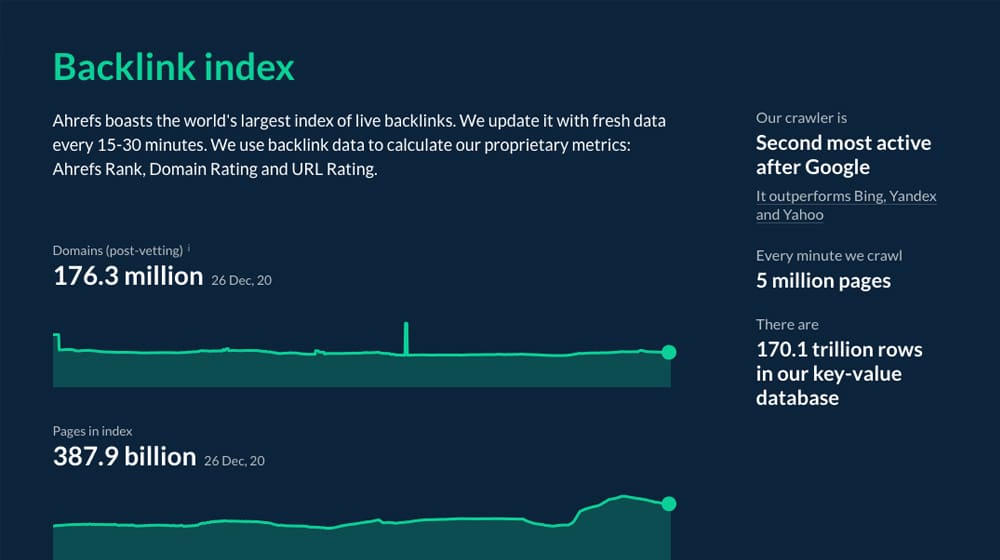
The Top Pages report allows you to look at any website and generate a review of the pages on their site that rank and perform the best. It's date-filtered with historical data, it can show percentage changes over time, it can show estimated PPC costs, and most importantly, it can show you the primary keywords a given page is targeting.
To be honest here, if you stopped with this one, you'd be able to do 90% of what I do in my research. That's how important and how accurate this tool is. The only reason it's not just the only thing I'm listing here is the cost. Ahrefs will run you about $100 a month for the cheapest plan they offer. It's plenty for most people – you still get up to 175 domains searched per week in the Site Explorer – but it's still a relatively steep cost. It's 100% worth the price of admission, in my opinion, so give it a try.
2. Alexa's Competitor Keyword Matrix
Alexa used to be a big deal - so much so that a lot of sites were posting their Alexa rank as a little badge of honor. Those days are mostly over (though some people still like to monitor their global and national rankings), but Alexa still exists. It might even surprise you that they're one of the better analytics companies out there.
I suppose it stands to reason. After all, Alexa is an Amazon company now, and with Amazon money to throw at a problem, they can accomplish pretty much anything. It's all a matter of how much you're prepared to use their data, and how much you're willing to pay to access it.
Alexa offers a Competitor Keyword Matrix report, which is available in a limited form in their free accounts but is much more detailed in their paid plans. You can plug in sites and get a report of the top keywords the site ranks for. The free plan shows you five for the domain, which isn't much, but it's plenty for a free tool. Just seeing the top-performing keywords for your competition can give you a good idea of where to start your research, especially when you're checking dozens of different competitors.
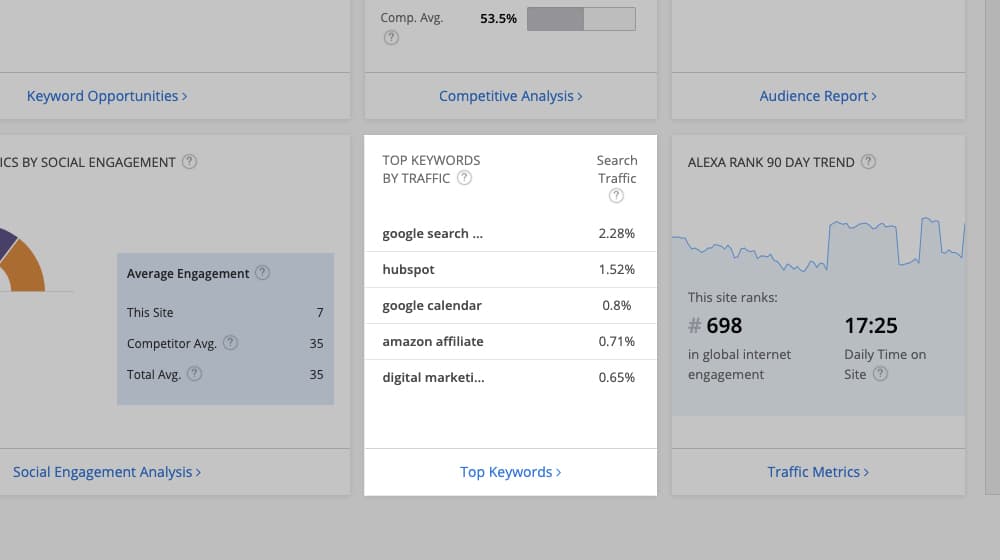
The matrix report is very good at showing the overlap between your site and your competitors. It shows keywords you both rank for, how you stack up to one another, and what keywords stand out that one of you ranks for and the other doesn't. This is all some pretty great information you can use to target your future content efforts.
Alexa also has a very useful feature called the audience overlap tool. This tool generates reports based on keywords and audience usage, rather than domains. Why is it useful? It can help identify websites that are competitive in your niche that you might not have even known existed. You're certainly aware of the household-name competition, but there are a lot of smaller sites out there you can use as inspiration and research.
Alexa's free plan gives you some limited access to these tools, but it's generally better if you're willing to pay for it. They have a one-size-fits-all pricing plan of $150 per month, which is even steeper than Ahrefs, but it's still a ton of value for the cost. You'll see most of this data overlaps with the data on Ahrefs.
3. Moz Link Explorer
Moz is one of the biggest names in SEO for a reason. While their index might not be as large as Ahrefs, it's still enormous, and that gives them more than enough data to come up with powerful, useful content for their reports.
Specifically, I like the Link Explorer tool. It's more focused on backlink data than it is keyword data, but that's the thing with SEO, right? Those two are interlinked. Links come from related, relevant pages. Anchor text is often related to keywords.
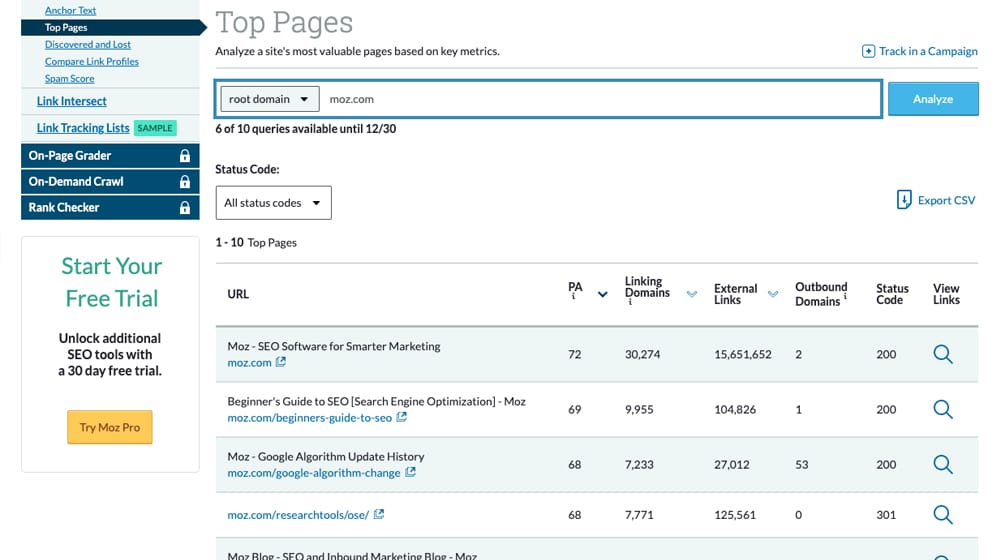
Moz also gives you quite a bit of access to data with a free account, which you need to use the free tools. It's basically to keep bots out; just sign up with an email address and you're good to go. Once you have that account, Link Explorer is trivial to use. Just plug in a domain and look at the report.
There are a few things you can look at here. With links, you can look at the top linking pages to see what they're about, and what pages are being linked to. You can also look at the top anchor text to see what is most commonly used in links pointing at the page. The top few entries will be the brand name, most likely, but you'll see a few other options as well, usually keywords you can research.
The other thing you can do is click on the Top Pages report. This shows you a report of the site you're researching, showing the pages with the best Page Authority, number of linking domains, number of links, and so on. Viewing the top pages on a site gives you insight into their best content, which is an opportunity for you.
You can get the basic reports for free, as I mentioned. The cheapest Pro plan is $100 per month and gives you more data, more rows, saved projects, and a lot else. I've been fine with the free version for the most part, but you can try their free trial and see if it's worth paying for, as well as checking their pricing page and comparing plans.
4. SEMrush
SEMrush is probably the best tool on the market that I don't use as much as I should. Frankly, I use Ahrefs so much that I forget about the others. SEMrush is generally a great tool, though, and it has a lot to offer.
First of all, they have an organic competitor report that shows competitors, as analyzed by their index, which can come up with some names you might not have noticed. It's as easy as clicking a report, so you don't need to configure or set up anything.
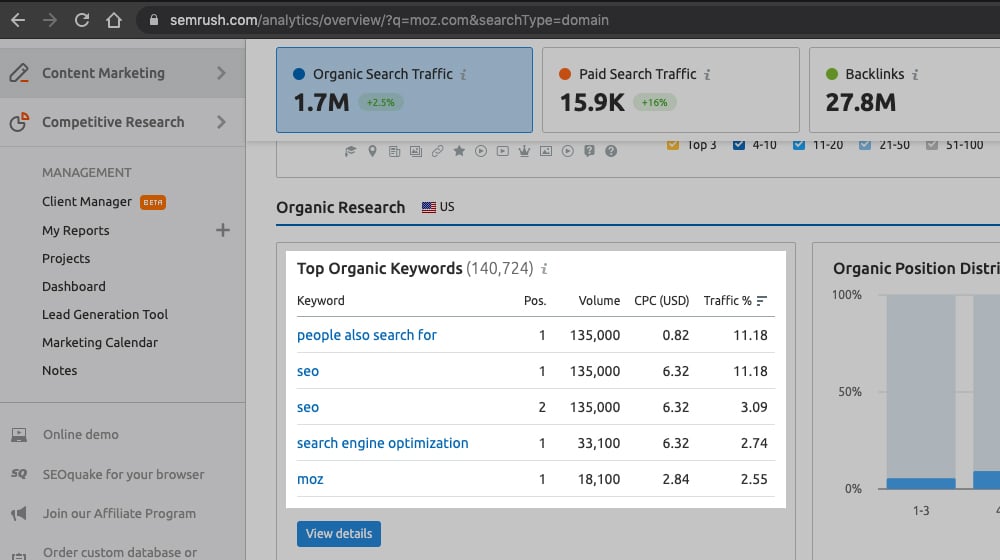
The position changes report shows pages that rank, how they rank, and how they're trending. This is a lot of useful information and can help pinpoint what the best content on each competitor's site is. You can correlate this with top pages reports from other tools to verify the accuracy of the tool.
The keyword gap report is an easy way to see keywords in a comparison between two to five sites at a time and can show you keywords that you aren't using but should be. Again, features you can get in other tools, but conveniently available in one place here. I can't vouch for how accurate their data is in comparison because, again, I haven't dug into it quite as much as I should. They do, at least, have a good categorization system so you can see the strong performers at a glance.
There's a lot more to SEMrush besides those, too. They even have a whole page dedicated to telling you how to use their tool for competitor analysis. Give it a try, and let me know what you like most about it. It's only $100 per month, comparable to other tools on the list, and they have a free trial too.
5. Site Searching
Here's something that surprisingly few SEO experts seem to know, but it makes sense when you think about it. You can search your site on Google and see which pages are listed most prominently.
What I mean is that, when you do a site search for your blog (such as site:contentpowered.com/blog/), you get a list of all of your content in Google's index. More importantly, though, that content is sorted more or less by how well it performs and ranks.
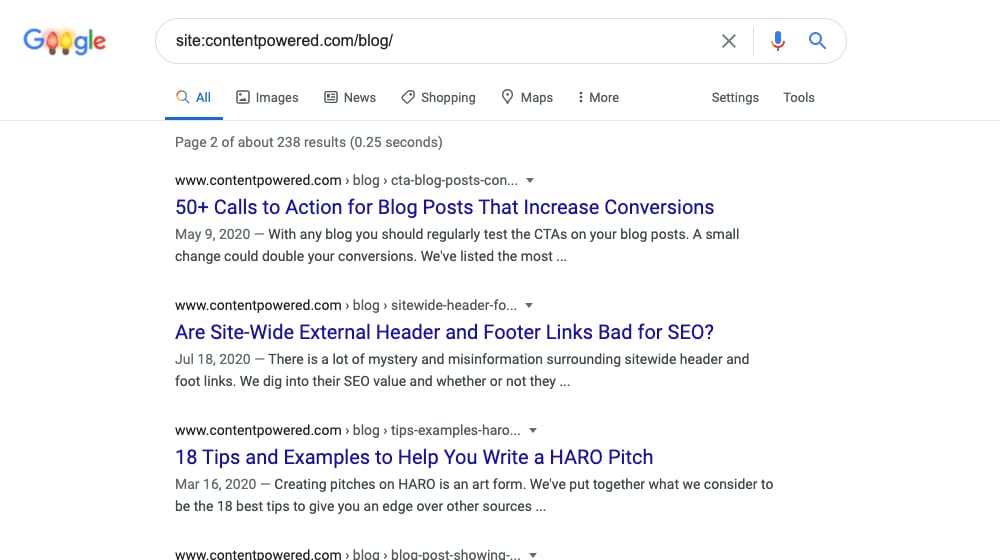
Sure, a lot of system pages and category pages are going to show up, because those naturally tend to have more links pointing to them internally. Content will show up, though, and you can use this to view what content is ranking the best on a given site. That gives you an organic idea of what content is the strongest on a competitor's site, which you can then use to target them. Plus, of course, using Google search is free.
How to Use the Information You Find
So now that you have all of this information, what can you do with it?
1. Target the same keywords and try to out-rank your competitors. Embark on a campaign of 10x content. You have the target keywords your competitors are using, so search them and see where they rank. Look at the content they created. Make content in a similar vein, cover a similar topic, and target the same keyword. The idea is to strive to out-do them. Go broader than they did, pulling in more information from more sources to synthesize into broader applications. Go deeper than they did, drawing conclusions and discussing the ramifications of those conclusions. Include more sources, deeper sources, broader sources. Essentially, make your content 10x better than theirs. This is the idea behind pillar content.

You can only do this so much before the content arms race results in extremely diminished returns for the effort, but you can try. Most blogs out there aren't working at more than the bare minimum it takes to rank; it's not that difficult to out-do them.
2. Look for gaps in your competitors' coverage. You have the list of keywords they're targeting; now look for the ones they aren't. There are a ton of keywords, both top-level and long-tail, and a company can only target so many at a time. Whether it's with paid ads or organic content production, there's a limit to how much even the biggest company can produce in a year.
Look for gaps in what your competitors are covering and get there first. There's a sad fact in content marketing that the first to market is often the one that does the best, simply because everyone else references or cites the first content. Now, you're pretty unlikely to be the actual first to market for a given keyword – there's simply too much being published for any topic to go unnoticed – but you can beat your competitors to the punch.
If you make content sufficiently high quality and compelling, chances are that your competitors might not even try. They could see that the competition is too fierce and abandon those keywords entirely. Of course, you'll have to pay attention, to make sure they aren't just 10xing you the way you were to them.
3. Synthesize new keywords based on information from both your and their research. Between your research and that of your competitors, you can get a more thorough overview and understanding of the users in your industry. You can use this broader understanding to combine research from both sides and find opportunities neither of you has thought of before.
4. Compare the results between your company and theirs. You have the complete list of what you're targeting and where you rank, and now you have a list of what your competitors are targeting and how they perform. In areas where there's overlap, dig in and look at how you're performing. If you're out-ranking them, great! If they're out-ranking you, figure out why. Do they have a great post, or is your coverage poor? Are they keeping a post up to date, while you aren't? Do they have authoritative references or high-quality links you don't? Dig in, and you can find ways to improve and out-do them.



 30 Second Summary
30 Second Summary



March 30, 2021
i'm a long-time moz user and just tried their pro trial. it's fine but i can live without it. i'll probably go back to the free version once the trial has ended.
March 31, 2021
Hey Robert! Thanks for your comment. I think Pro is mostly beneficial for API access and bulk queries. If you're not running an agency or doing any sort of hardcore prospecting or link building, or if you aren't building or running a web app for marketing, the Pro version is probably not needed for personal use.
February 22, 2022
Ahrefs is my ultimate favorite tool so I agree that it's worth every penny.
March 04, 2022
Mine too!